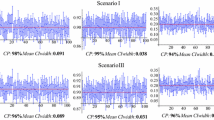Abstract
Start-up demonstration tests and various extensions have been discussed, in which a unit under the test is accepted or rejected according to some criteria. CSTF, CSCF, TSCF and TSTF are most well known start-up demonstration tests. In this paper, two kinds of more general start-up demonstration tests are introduced. CSTF, TSTF, TSCF and CSCF are all special situations of the new tests. For the new generalized start-up demonstration tests, under the assumption of independent and identically distributed trials for each test, the analytic expressions for the expectation, the probability mass function and the distribution of the test length, as well as the probability of acceptance or rejection of the unit are given. All the analyses are based on the finite Markov chain imbedding approach which avoids the complexities of the probability generating function approach and makes the results readily understood and easily extended to the non-i.i.d. cases. Furthermore, an optimal model for generalized start-up demonstration tests is proposed. Finally, a numerical example is presented to make our results more transparent, and it can demonstrate the advantages of the new tests.




Similar content being viewed by others
Abbreviations
- CS:
-
consecutive successes;
- CSTF:
-
consecutive successes total failures;
- TSTF:
-
total successes total failures;
- CSCF:
-
consecutive successes consecutive failures;
- TSCF:
-
total successes consecutive failures;
- R 1-CS/TS/R 2-CF/TF:
-
R 1 runs of consecutive successes, total successes, R 2 runs of consecutive failures, total failures;
- R 1 :
-
the number of non-overlapping successful runs required for acceptance;
- k C :
-
the number of consecutive successes in a successful run;
- k T :
-
the number of total successes required for acceptance;
- R 2 :
-
the number of non-overlapping failed runs required for rejection;
- d C :
-
the number of consecutive failures in a failed run;
- d T :
-
the number of total failures required for rejection;
- T l :
-
the test length (e.g. the number of tests) until termination of the test;
- α :
-
the producer’ risk;
- β :
-
the consumer’ risk.
References
Aston, J. A. D., & Martin, D. E. K. (2005). Waiting time distributions of competing patterns in higher-order Markovian sequences. Journal of Applied Probability, 42(4), 977–988.
Balakrishnan, N., & Chan, P. S. (2000). Start-up demonstration tests with rejection of units upon observing failures. Annals of the Institute of Statistical Mathematics, 52(1), 184–196.
Balakrishnan, N., & Koutras, M. V. (2002). Runs and scans with applications. New York: Wiley.
Balakrishnan, N., Mohanty, S. G., & Aki, S. (1997). Start-up demonstration tests under Markov dependence model with corrective actions. Annals of the Institute of Statistical Mathematics, 49(1), 155–169.
Bhat, U. N. (1984). Elements of applied stochastic processes (2nd ed.). New York: Wiley.
Cui, L. R., Xu, Y., & Zhao, X. (2010). Developments and applications of the finite Markov chain imbedding approach in reliability. IEEE Transactions on Reliability, 59(4), 685–690.
Fu, J. C., & Koutras, M. V. (1994). Distribution theory of runs: a Markov chain approach. Journal of the American Statistical Association, 89(427), 1050–1058.
Fu, J. C., & Lou, W. Y. W. (2003). Distribution theory of runs and patterns and its applications. Singapore: World Scientific.
Gera, A. E. (2010). A new start-up demonstration test. IEEE Transactions on Reliability, 59(1), 128–131.
Hahn, G. J., & Gage, J. B. (1983). Evaluation of a start-up demonstration test. Journal of Quality Technology, 15(3), 103–106.
Martin, D. E. K. (2004). Markovian start-up demonstration tests with rejection of units upon observing d failures. European Journal of Operational Research, 155(2), 474–486.
Martin, D. E. K. (2008). Application of auxiliary Markov chains to start-up demonstration tests. European Journal of Operational Research, 184(2), 574–583.
Smith, M. L., & Griffith, W. S. (2005). Start-up demonstration tests based on consecutive successes and total failures. Journal of Quality Technology, 37(3), 186–198.
Smith, M. L., & Griffith, W. S. (2008). The analysis and comparison of start-up demonstration tests. European Journal of Operational Research, 186(3), 1029–1045.
Viveros, R., & Balakrishnan, N. (1993). Statistical inference from start-up demonstration test data. Journal of Quality Technology, 25(2), 119–130.
Zhao, X., & Cui, L. R. (2009). On the accelerated scan finite Markov chain imbedding approach. IEEE Transactions on Reliability, 58(2), 383–388.
Zhao, X., Cui, L. R., & Kuo, W. (2007). Reliability for sparsely consecutive-k systems. IEEE Transactions on Reliability, 56(3), 516–524.
Author information
Authors and Affiliations
Corresponding author
Additional information
This work is supported by the National Natural Science Foundation of China (70901008), the Specialized Research Fund for the Doctoral Program of Higher Education (20091101120053), the Excellent Young Scholars Research Fund of Beijing Institute of Technology (2010YS1304), and the Excellent Talent Culture Foundation of Beijing (2009D013001000040).
Rights and permissions
About this article
Cite this article
Zhao, X. On generalized start-up demonstration tests. Ann Oper Res 212, 225–239 (2014). https://doi.org/10.1007/s10479-012-1279-y
Published:
Issue Date:
DOI: https://doi.org/10.1007/s10479-012-1279-y




